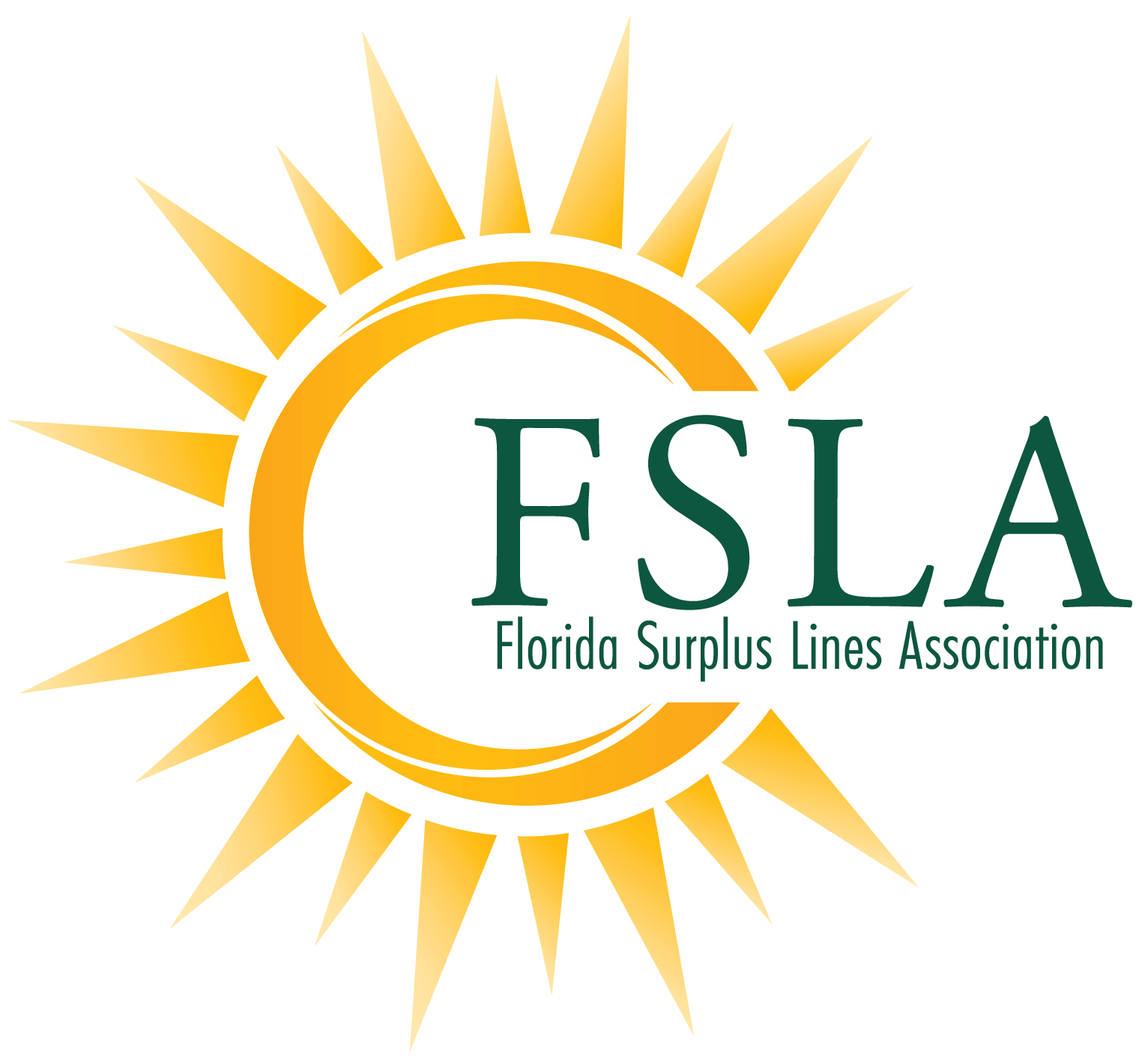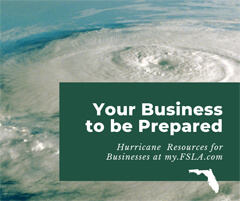CONTACT: Allison Aubuchon, APR
communications@allisonaubuchon.com | 850.766.5255
FOR IMMEDIATE RELEASE
Weathering the Storm: Preparing Businesses to be Resilient
FSLA Highlights Tips for Businesses on Insurance Awareness Day
Tallahassee, Fla. (June 28, 2023) – Insurance Awareness Day, June 28, reminds consumers to hope for the best but prepare for the worst. During the first month of the Atlantic Hurricane Season, Florida’s surplus lines insurance industry — which works frequently with businesses as a safety valve for unique insurance needs — is celebrating Insurance Awareness Day by encouraging business owners to prepare for and prevent hurricane damage.
To highlight tips and resources, the Florida Surplus Lines Association (FSLA) recorded a virtual panel of leading experts in the areas of insurance consumer protection and flood resilience, including:
- Tasha Carter, Florida’s Insurance Consumer Advocate,
- Brad Turner, Associate Vice President & National Product Manager (Flood) at Burns & Wilcox, and
- Chris Siegel, Associate Vice President/Managing Director (Orlando) at Burns & Wilcox.
“In a world grappling with the increasingly unpredictable forces of nature, it is crucial that we address the challenges posed by hurricanes and equip Floridians to safeguard our communities and businesses,” said FSLA Board Member Al Geraci, ARM, ASLI, of Risk Placement Services, who moderated the panel highlighting best practices and lessons learned. “We can work toward creating a culture of preparedness to help Florida residents and businesses plan, prepare and protect.”
 View tips via YouTube, toggle between topics and share the video:
View tips via YouTube, toggle between topics and share the video:
https://youtu.be/AtdF8KcfTzo
Brad Turner emphasized that businesses should not wait until a storm is imminent to prepare.
“I think a lot of people scramble or it seems like they scramble to get coverage in place in the last hour and unfortunately, it’s sometimes too late,” said Turner. “Even a five person small business needs to have a plan of action. How are you going to handle returning to your business? And if you did have to leave, how are you going to handle the business immediately after the storm? It is important to have a plan of insurance and know how you will get back up and running if you have damage to your property.”
Key tips from panelists recommended that Florida businesses:
*These and more are discussed in the video linked above.
- Do not wait until the last minute to prepare.
- Read your insurance policy and know its exclusions/ limitations. Know what it is designed to cover and how limitations could apply to your deductibles.
- Know your out-of-pocket deductible and whether it will be worth the severity of the claim.
- Understand how quickly you will have to report damage.
- Know your exposures — think about wind and flood exposures in particular. Have your business evaluated for its exposure prior to a storm.
- Know what your policy says about mitigating loss. Most insurance policies have provisions that allow you to prevent loss before it happens. This might include sandbag resources or covering costs for moving contents elsewhere.
- Review policy guidance on what to do after a loss: Should you separate damaged goods that need to be replaced versus ones that need to be repaired?
- Know your direct and indirect loss potential, meaning if you’re unable to access the property to run your business, or it’s months before you can get back up and running, what income are you going to lose?
- Have printed and virtual copies (saved online / in the cloud) of documents necessary for filing claims and making your business whole: Tax records and legal documents, and proof of income the business was generating / financial history.
- Store these and other important documents in a watertight / fireproof box: insurance policies and contacts for your insurance carriers (wind, flood) so that you can immediately make the claim.
- Have a detailed inventory of your business contents and its value, and review this annually. Take photos of your business’ exterior and interior.
- Have a plan to evacuate.
- Have a recovery plan, including an employee contact plan / hierarchy of contacts for communication — this should be physical copy as well.
- Have a backup plan for online systems and transactions if the internet or power is down.
- To mitigate water intrusion, consider installing flood gates, elevating inventory or moving it to a second story.
- Secure the property: check the roof prior for loose siding or materials. Secure any adjacent property, and consider shutters for protecting glass.
- Clean out drains and be aware of where water can intrude / come back into a structure — consider water shutoff valves.
- Be able to track the storm’s path — consider a weather radio.
For assistance when filing post-storm claims, Floridians can call the Florida Department of Financial Services at 1-877-MY-FL-CFO (693-5236) or visit www.MyFloridaCFO.com.
Facts on Flood Insurance
ICA Carter highlighted the fact that most business insurance policies do not cover losses resulting from floods, however, business owners should not bypass this important coverage.
“Flooding can occur anywhere,” said ICA Carter. “If it rains, it can flood. According to FEMA, just one inch of flood water can cause more than $25,000 in damages.”
A vast majority of flood insurance coverage is federally regulated and provided through the National Flood Insurance Program, which is administered through FEMA. The Florida Office of Insurance Regulation has worked over the last several years to expand Florida’s private flood insurance market to provide for more consumer choice and competition in the marketplace. Currently, there are 33 insurance companies eligible to write flood insurance policies in Florida.
“Although you can purchase flood insurance at any time, what is significantly important is to not wait until a hurricane or a major storm is threatening to impact the state,” added ICA Carter. “It is important while preparing for a disaster to purchase flood insurance, as there is typically a 30-day waiting period before your flood insurance takes effect.”
State Resources
- biz: This partnership between the Florida Department of Economic Opportunity and the Florida Division of Emergency Management and local, state and federal agencies provides businesses with resources before, during and after a disaster.
- Florida Home Hardening Sales Tax Exemption: Championed by the state’s Chief Financial Officer, Jimmy Patronis, this is a two-year, $462 million statewide sales tax exemption period on the purchase of impact resistant doors, impact resistant garage doors as well as impact resistant windows. This allows Florida homeowners as well as business owners to save on taxes while purchasing items to help mitigate, fortify and strengthen homes and businesses against hurricanes, and it runs through June 30, 2024.
- My Safe Florida Home Program: While this program is not applicable to commercial properties, ICA Carter added that since many business owners also own homes, the My Safe Florida Home program is important to recognize. It provides funds to obtain free hurricane mitigation inspections and matching grants to harden your home to reduce the likelihood of damage sustained by hurricanes. For each $1 that is spent on mitigation or hardening improvements, the program provides $2, up to $10,000 maximum.
Red Flags for Fraud
ICA Carter also highlighted several red flags business owners should be on the lookout for and signs of potential insurance fraud. She urges Floridians to contact their insurance companies first to file a claim.
Signs of fraud may include:
- Contractors who show up unsolicited and point out damage you have not previously noticed,
- Contractors who promise services at no charge to you or offer to waive your insurance deductible,
- Contractors not willing to provide evidence they are licensed and insured,
- Contractors who provide an estimate notably lower or significantly higher in comparison to other estimates for the same work,
- Contractors requiring you to pay the full amount of the repair expense upfront or requiring large deposits to be paid using cash, or
- A refusal to put things in writing.
To report fraud, Floridians can contact their insurance carrier’s fraud line, report to the National Insurance Crime Bureau, or call the Fraud Tip Hotline at 1-800-378-0445 or visit www.FraudFreeFlorida.com.
“Staying ahead of fraud benefits all policyholders in an effort trying to keep premiums as reasonable as possible,” said Chris Siegel. “Florida takes reports of fraud seriously because it is a significant detriment to the insurance community at large, not only policyholders and not only the carriers but every transaction point along the way.”
The Health of the Insurance Marketplace
Challenges in Florida’s insurance market were addressed during the 2023 Legislative Session, with lawmakers passing historic reforms with the goal to improve conditions, expand options and lower costs for Floridians. While it may take a 12-month cycle to measure the impacts of changes from the legal environment, Siegel remarked on the significance of the recent reforms.
“A lot of progress has been made,” added Siegel. “The State of Florida has taken significant action with bills in an attempt to try and stabilize the market. One of the significant pieces of legislation was the removal of assignment of benefits (AOB) provisions, which have had a severe impact on the loss history, starting with water damage claims and then progressing into roof claims.”
While surplus lines serve as an important piece in the overall insurance market puzzle, they are not a true substitute for a healthy domestic market. As capacity in the admitted market increases, surplus lines will be able to appropriately serve as its backup for unique, unusual and large risks.
About FSLA:
The Florida Surplus Lines Association (FSLA) is an association representing excess and surplus lines agency member firms and associate members in Florida. Over the past 60 years, FSLA has promoted the regulatory and legislative interests of FSLA members and the Florida surplus lines industry, with a focus on supporting opportunities and insuring risks throughout Florida. The Florida Surplus Lines Association serves as a voice and a resource for its members and is consistently recognized for being one of the most active in the nation, ranking among the top three surplus lines associations in the country. Learn more at www.myFSLA.com.
# # #




